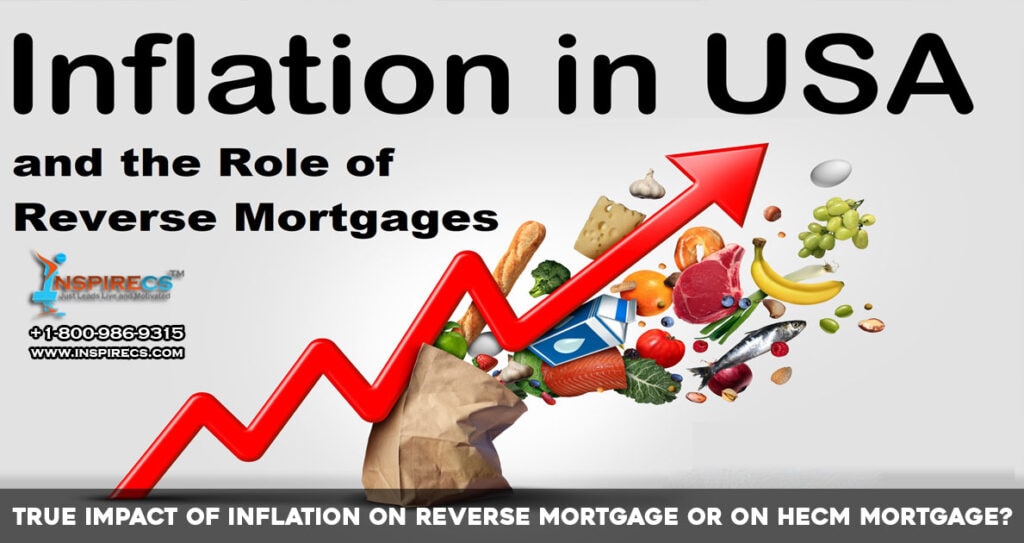
Inflation is a significant economic factor that affects various aspects of the financial side of our lives. It refers to the rise of prices of goods or services over time. In other words, inflation makes money worth less than before. It also means that people need to spend more money to buy the same things after some time.
For instance, if an oven cost $1000 last year and $1200 this year, it is inflation. Several factors may contribute to a rise in inflation such as higher production cost, higher demand, or even more money circulating in the economy. As inflation affects the buying power of people, organizations, and governments, it is important for them to keep an eye on it. Now, the question is “What is the true Impact of Inflation on Reverse Mortgages or on HECM Mortgage?” Let’s dive deep and find out.
What are Reverse Mortgages?
Before understanding the true impact of inflation on Reverse Mortgages or on HECM mortgages, it is important to understand what exactly reverse mortgages are. A reverse mortgage is a type of loan that allows senior homeowners to tap into their home equity without having to sell their home. Therefore, it is unlike traditional mortgages, where lenders bound homeowners to make monthly payments to them. Conversely, a reverse mortgage enables homeowners to receive payments from lenders. The loan is repaid only when the homeowner sells the home, moves out permanently, or passes away.
The true impact of inflation on Reverse Mortgage or on HECM Mortgage
As mentioned earlier, inflation makes money worth less over time. Therefore, it may also indirectly affect borrowers by making loan repayment challenging. How so? It is because of higher interest rates and lower purchasing power. Now, let’s try to understand whether inflation impacts Reverse Mortgage or HECM Mortgage.
The relationship between inflation and Reverse Mortgages is very crucial for senior homeowners to understand to make better financial decisions. Inflation impacts all types of loan repayments and Reverse Mortgages aren’t an exception. The following aspects determine how much inflation affects HECM.
Impact on borrowing capacity
Inflation directly impacts the borrowing capacity of a reverse mortgage. As several factors such as the age of the borrower, the appraised value of the home, current interest rates, etc. determine the amount that a homeowner can borrow with an HECM, Reverse Mortgages tend to vary with varying inflation rates. For instance, home values tend to rise during periods of high inflation, and in turn, their home equity increases. Such a scenario potentially allows homeowners to qualify for higher loan amounts.
Inflation and interest rates
Inflation and interest rates are also closely linked. All central banks across the globe often raise interest rates to combat high inflation. If a central bank like the Reserve Bank increases interest rates, it directly impacts HECM. This is because the maximum loan amount is inversely related to interest rates. In other words, if the interest rate increases, the principal borrowing amount decreases. For instance, a higher interest rate reduces the amount of money a senior homeowner can borrow through a Reverse Mortgage. Conversely, when interest rates are low, the principal limit increases and therefore, allows homeowners to receive more money from the Reverse Mortgage.
Purchasing power of loan proceeds
The purchasing power of loan proceeds is another but more subtle effect of inflation on HECM. Therefore, higher inflation causes the loan payments or lump sums received from a reverse mortgage to cover less expenses because inflation causes the value of money to decrease over time. Arguably, the same HECM loan amount would cover more expenses in a lower-inflation environment. Therefore, it is a major concern for retirees to think about as they have to rely on these funds for their living expenses.
Loan balance growth
Inflation also impacts loan balance growth. As you already know, Reverse Mortgages have a unique feature where the loan balance grows over time because of the accrual of interest and other fees on the loan and inflation affects its rate of growth. However, periods of high inflation suit HECM borrowers because the nominal value of this growing loan balance may seem less challenging. But, there is another very important factor that homeowners need to consider. While the real value (adjusted for inflation) of the debt may decrease with higher inflation, the loan balance itself also continues to rise which may potentially erode the homeowner’s remaining equity.
Values of home equities
There is another significant aspect that homeowners need to consider during high periods of inflation and that is the rising values of home equity. As you know, high inflation causes home values to rise. Therefore, homeowners may see their home equity value rise. However, the growing loan balance offset the growing home equity values. In simple words, the rising home values and the growing loan balance simultaneously make this aspect a delicate one. So, homeowners should consider the net effect of both these factors on their equity when making HECM borrowing decisions.
Strategic considerations for HECM borrowers given the impacts of inflation on Reverse Mortgages
So, what are the strategic considerations for current or prospective Reverse Mortgage borrowers that they need to consider when making important HECM financial decisions? Here are some strategic considerations for HECM borrowers looking to offset the impacts of inflation on Reverse Mortgages
Timing of the loan
As higher inflation leads to increasing home value, and that in turn leads to a higher amount of HECM loan received, the timing of getting a loan is important. Therefore, if you are anticipating the rise of inflation, you should wait until your home value increases. It will enable you to secure more loan amounts to meet your expenses.
Balancing rising home values against the potential for rising interest rates
Try to balance rising home values against the potential for rising interest rates. It is important because higher interest rates may significantly reduce the principal limit.
Planning the use of funds from an HECM
Carefully plan the use of funds from an HECM. During periods of high inflation, it is crucial to prioritize essential expenses. You may also look for investment opportunities to hedge against high inflation.
Consulting financial advisors
Consult financial advisors to measure the relationship between inflation and Reverse Mortgage. It will also help you understand all the complexities associated with inflation and reverse mortgages. Advisors may provide personalized assistance and devise effective strategies to make well-informed financial decisions.



